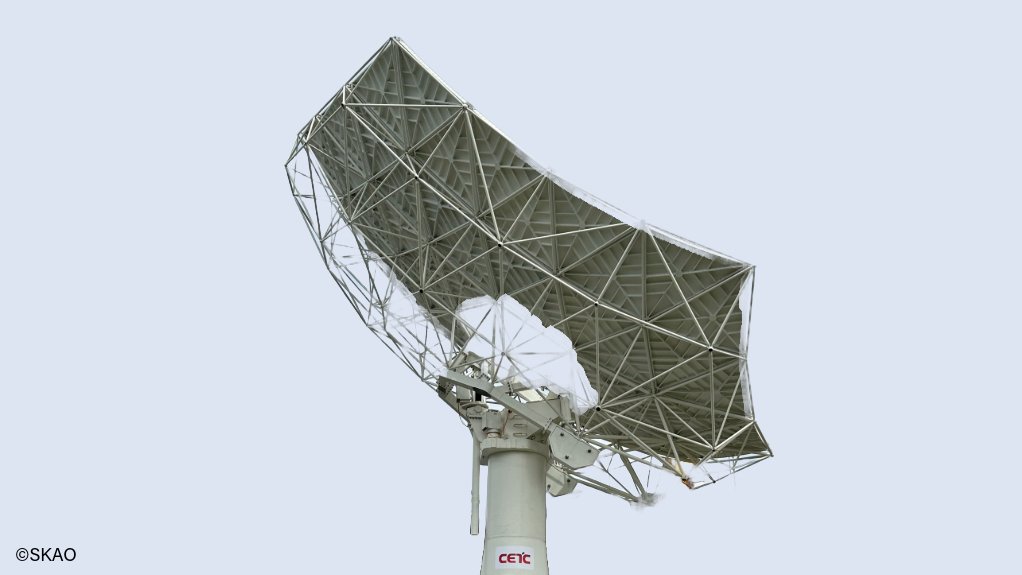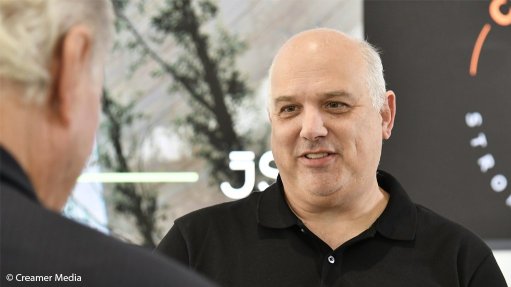First SKA dish erected in the Karoo
The Square Kilometre Array (SKA) Observatory (SKAO) has announced that the first telescope dish for its SKA-Mid array has been assembled on site, in the Karoo region in the Northern Cape province. The SKAO is the international organisation responsible for the SKA, which will be the world’s biggest radio telescope array and will be composed of two instruments, SKA-Mid in South Africa, and SKA-Low in Australia, covering different but complementary radio frequency bands. Both arrays are being built in phases. The SKAO is headquartered in the UK.
The 15-m-diameter dish of the antenna was actually lifted on to its pedestal on Thursday last night, but only announced a week later. The operation was carried out by a combined team from the SKAO, the South African Radio Astronomy Observatory (SARAO), and Chinese company CETC54, which is manufacturing the dishes. CETC54 also led the ten-country consortium that designed the dishes.
The first phase of SKA-Mid will comprise just four antennas, and is dubbed Array Assembly 0.5 (AA 0.5). This quartet will be used for testing and for a process review, before full-scale production of the dishes is started. SKA-Mid will cover the radio frequency range from 350 MHz to 15.4 GHz, with the ambition of ultimately increasing this to 24 GH.
“As a team we are now totally focused on the next stage of activities because we have already got two more dish structures on site, ready for assembly,” reports SKA-Mid site construction director Tracy Cheetham. “This is a complex environment, with many variables, but we are in a strong position to proceed with the next steps towards AA 0.5.”
The construction contract for the SKA-Mid dish band 2 receiver (each dish will have more than one receiver) has been awarded to South African company EMSS Antennas. Based in Stellenbosch, in the Western Cape province, EMSS is a specialist in extremely sensitive cryogenically-cooled receivers (also known as feeds). Other components for the SKA-Mid are being manufactured in Italy, Spain, Sweden and the UK.
“There’s a lot of work ahead of us, but for everyone involved, this is a special moment that represents years of toil by people all over the world, so I want to thank them for their dedication in getting us here,” stresses SKA-Mid senior project manager Ben Lewis. “Special thanks must go to our partners at SARAO and CETC54 for their professionalism and commitment – this collaboration is really bearing fruit. The first of anything is always the most challenging, and we have learnt a huge amount from a logistical and technical perspective from this first dish. That will inform our planning going forward as we prepare to deliver a four-dish array early next year, before ramping up to ‘full speed’ construction later in 2025.”
The roll-out of the much simpler and smaller (just 2 m tall) SKA-Low antennas in Australia began in March. So far, more than 1 000 of these have been deployed, in four groups, or “stations”. SKA-Low will be composed of 512 such stations, totalling 131 072 antennas, covering the frequency range from 50 MHz to 350 MHz.
“The progress this year across the Observatory has been amazing, and seeing the first SKA-Mid dish being erected is a significant moment as we head towards the first stage of telescope delivery,” highlights SKAO acting director of programmes Luca Stringhetti. “There have been challenges, as we anticipated there would be, but it is thanks to the coordinated effort and support of our partners across the globe, combined with significant logistical work by teams at the telescope sites and our HQ, that we have been able to deploy the first dish structure and four stations on the ground in both of our telescope host countries.”
Article Enquiry
Email Article
Save Article
Feedback
To advertise email advertising@creamermedia.co.za or click here
Announcements
What's On
Subscribe to improve your user experience...
Option 1 (equivalent of R125 a month):
Receive a weekly copy of Creamer Media's Engineering News & Mining Weekly magazine
(print copy for those in South Africa and e-magazine for those outside of South Africa)
Receive daily email newsletters
Access to full search results
Access archive of magazine back copies
Access to Projects in Progress
Access to ONE Research Report of your choice in PDF format
Option 2 (equivalent of R375 a month):
All benefits from Option 1
PLUS
Access to Creamer Media's Research Channel Africa for ALL Research Reports, in PDF format, on various industrial and mining sectors
including Electricity; Water; Energy Transition; Hydrogen; Roads, Rail and Ports; Coal; Gold; Platinum; Battery Metals; etc.
Already a subscriber?
Forgotten your password?
Receive weekly copy of Creamer Media's Engineering News & Mining Weekly magazine (print copy for those in South Africa and e-magazine for those outside of South Africa)
➕
Recieve daily email newsletters
➕
Access to full search results
➕
Access archive of magazine back copies
➕
Access to Projects in Progress
➕
Access to ONE Research Report of your choice in PDF format
RESEARCH CHANNEL AFRICA
R4500 (equivalent of R375 a month)
SUBSCRIBEAll benefits from Option 1
➕
Access to Creamer Media's Research Channel Africa for ALL Research Reports on various industrial and mining sectors, in PDF format, including on:
Electricity
➕
Water
➕
Energy Transition
➕
Hydrogen
➕
Roads, Rail and Ports
➕
Coal
➕
Gold
➕
Platinum
➕
Battery Metals
➕
etc.
Receive all benefits from Option 1 or Option 2 delivered to numerous people at your company
➕
Multiple User names and Passwords for simultaneous log-ins
➕
Intranet integration access to all in your organisation





















